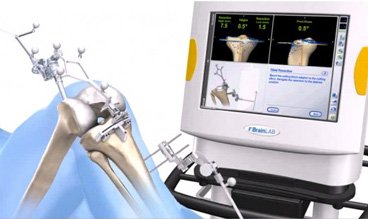
If you have severe arthritis of the knee, you’re probably
aware of total knee replacement surgery. Now discover how a dramatically
modernized approach to this procedure offers you outstanding advantages in accuracy
of fit, surgical safety and natural-feeling results.
Traditional total knee replacement has been performed for
about 40 years. Now, however, an advanced patient-customized procedure offers
benefits beyond those possible before. Through 3-D computer modelling, we can
now achieve perfect alignment of the prosthetic knee with your bone structure.
We can also create patient-customized instruments with which to perform the
procedure. It all adds up to a far more accurate fit between your body and the
prosthetic knee; faster and safer surgery; quicker recovery from surgery; and
less time before you’re fully mobile.
The new process involves a lot more preoperative planning.
Six to eight weeks before surgery, you undergo a specialized MRI of the
involved knee that includes your hip and ankle. We send this image to the
manufacturer’s engineers who convert the MRI to a 3-D computer model of your
limb. The model is sent to me as a 3-D software package that shows the implant
superimposed over your unique bone structure.
The next step involves creating a more precise fit than ever
possible before. That’s because the 3-D model lets the surgeon make tiny
adjustments in size and position while viewing the entire area — even the back
of the knee, which is not visible during surgery. For the first time, a surgeon
can achieve perfect alignment, in which a straight line from the center of your
hip to the center of your ankle passes through the center of the knee.
Alignment is very important because it has been shown to directly affect the
long-term success of knee replacement when the implant is installed.
Thanks to a stereoscopic view of the area, we have complete
confidence in the fit of the implant. After the surgeon has digitally refined
the fit, the file is locked. No more changes are possible. Once it is sent back
to the manufacturer, their engineers begin doing something remarkable with that
data file.
Through 3-D printing, two specialized surgical instruments
are made that contour perfectly to your body – one for your femur (thighbone),
one for your tibia (shinbone). Because it all started with an MRI showing where
there’s healthy cartilage and where there’s bone, the surgical tools fit the
patient’s body like a hand in a glove. Patient-customized instruments let me
more precisely prepare your knee to receive the prosthesis.
The procedure is done with greater accuracy and in less time. Cutting 20 to 30 minutes off surgery makes it safer for the patient—reducing time under anesthesia, while decreasing the risk of infection, bleeding and blood clots. Post-surgical discomfort and stiffness are also reduced. Perhaps the best news is that you’ll make faster gains in rehab with a knee that fits optimally.
Rehab is a key part of recovering mobility. Post-surgery,
you’ll start off with a walker for about a week, then move to a cane for about
six weeks. Its valuable to be actively engaged in doing home exercises and
going regularly to therapy, usually three days a week for three months. The
last step is to get your strength back at the gym.